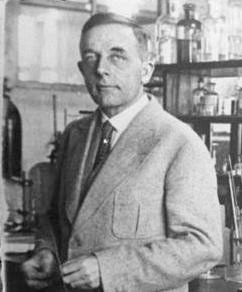Otto Heinrich Warburg
[[File: Otto Heinrich Warburg (8 October 1883 – 1 August 1970) was a German physiologist, medical doctor, and Nobel laureate. He is best known for his research on the process of oxidation and the metabolism of tumors. Warburg's work on the metabolism of tumors led to the development of the Warburg hypothesis, which proposes that cancer cells generate energy primarily through a high rate of glycolysis followed by lactic acid fermentation in the cytosol, in contrast to healthy cells which mainly generate energy from oxidative breakdown of pyruvate in mitochondria. His research has had a lasting impact on the fields of biochemistry and cancer research.
Biography[edit | edit source]
Otto Warburg was born in Freiburg, Baden, Germany, into a prominent family. His father, Emil Warburg, was a well-known physicist. Otto Warburg pursued his undergraduate studies at the University of Freiburg before moving to the University of Berlin to study chemistry under Emil Fischer, who was awarded the Nobel Prize in Chemistry in 1902. He then shifted his focus to medicine and received his doctorate in medicine in 1911 from the University of Heidelberg.
During World War I, Warburg served in the German army, but he was also allowed to continue his research in a specially equipped laboratory. After the war, he returned to his studies and research, which eventually led to his groundbreaking work on cellular respiration and photosynthesis.
In 1931, Warburg was awarded the Nobel Prize in Physiology or Medicine for his discovery of the nature and mode of action of the respiratory enzyme. Throughout his career, he was nominated for the Nobel Prize a total of 47 times across both physiology and chemistry.
Despite the rise of the Nazi regime in Germany, Warburg, who was of partial Jewish descent, was allowed to continue his research due to his international reputation and the intervention of Adolf Hitler's personal physician.
Research and Legacy[edit | edit source]
Warburg's most significant contribution to science was his research on the metabolism of tumors. He observed that cancer cells preferentially use glycolysis for energy production, even in the presence of oxygen. This phenomenon, later termed the "Warburg Effect," is considered a hallmark of cancer metabolism. His work laid the foundation for understanding the metabolic requirements of cancer cells and has influenced contemporary research into cancer treatments and diagnostics.
Warburg also made significant contributions to the study of photosynthesis, demonstrating the action of carbon dioxide in the process. His work in this area further cemented his reputation as a leading biochemist of his time.
Despite the controversy that sometimes surrounded his theories, particularly his singular focus on the role of glycolysis in cancer, Warburg's contributions to biochemistry and physiology have been invaluable. His research methods and findings continue to influence the fields of biochemistry, cell biology, and cancer research.
Death and Legacy[edit | edit source]
Otto Heinrich Warburg died on 1 August 1970 in Berlin, Germany. His legacy lives on through the Warburg hypothesis, which continues to be a subject of research and debate in the scientific community. Warburg's pioneering work has paved the way for further studies on cancer metabolism and the development of new cancer therapies.
Search WikiMD
Ad.Tired of being Overweight? Try W8MD's physician weight loss program.
Semaglutide (Ozempic / Wegovy and Tirzepatide (Mounjaro / Zepbound) available.
Advertise on WikiMD
|
WikiMD's Wellness Encyclopedia |
| Let Food Be Thy Medicine Medicine Thy Food - Hippocrates |
Translate this page: - East Asian
中文,
日本,
한국어,
South Asian
हिन्दी,
தமிழ்,
తెలుగు,
Urdu,
ಕನ್ನಡ,
Southeast Asian
Indonesian,
Vietnamese,
Thai,
မြန်မာဘာသာ,
বাংলা
European
español,
Deutsch,
français,
Greek,
português do Brasil,
polski,
română,
русский,
Nederlands,
norsk,
svenska,
suomi,
Italian
Middle Eastern & African
عربى,
Turkish,
Persian,
Hebrew,
Afrikaans,
isiZulu,
Kiswahili,
Other
Bulgarian,
Hungarian,
Czech,
Swedish,
മലയാളം,
मराठी,
ਪੰਜਾਬੀ,
ગુજરાતી,
Portuguese,
Ukrainian
Medical Disclaimer: WikiMD is not a substitute for professional medical advice. The information on WikiMD is provided as an information resource only, may be incorrect, outdated or misleading, and is not to be used or relied on for any diagnostic or treatment purposes. Please consult your health care provider before making any healthcare decisions or for guidance about a specific medical condition. WikiMD expressly disclaims responsibility, and shall have no liability, for any damages, loss, injury, or liability whatsoever suffered as a result of your reliance on the information contained in this site. By visiting this site you agree to the foregoing terms and conditions, which may from time to time be changed or supplemented by WikiMD. If you do not agree to the foregoing terms and conditions, you should not enter or use this site. See full disclaimer.
Credits:Most images are courtesy of Wikimedia commons, and templates, categories Wikipedia, licensed under CC BY SA or similar.
Contributors: Prab R. Tumpati, MD




